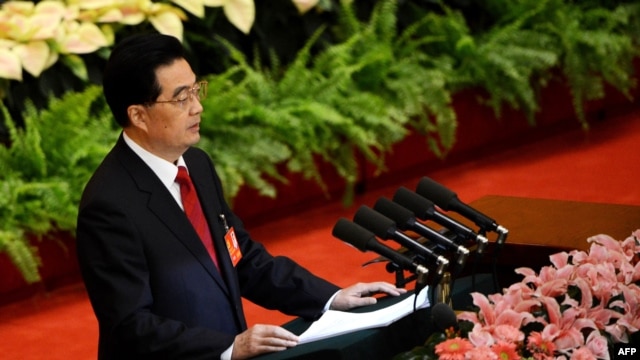
Chinese President Hu Jintao delivers his address at the opening of the 18th Communist Party Congress at the Great Hall of the People in Beijing, November 8, 2012.
BEIJING — China’s once-in-a-decade leadership transition began Thursday, with a warning from the country’s outgoing leader. In a long and wide-ranging speech to mark the beginning of China’s 18th party congress, President Hu Jintao warned that the party and even the country are facing fatal challenges if it does not do more to deal with the problem of corruption.
In his final remarks as leader of the political party that single-handedly rules 1.3 billion people and charts the course for the world’s second-largest economy, President Hu had a warning for the Chinese Communist party.
"Opposing corruption and building an honest and clean government is a clear stance the party has been adhering to and is an important political issue the people have been paying attention to. If we fail to handle this issue [corruption] well, it could prove fatal to the party and even cause the collapse of the party and the fall of the state," he said.
Hu made his remarks at Beijing’s massive Great Hall of the People, during the opening of the 18th party congress, a major political event in China which is held once every five years.
His comments could not have been more timely. This year’s meeting has been largely overshadowed by a murder and corruption scandal involving one of the party’s once-rising stars Bo Xilai.
The remarks resonated with Yu Jingzi, a delegate from Shanghai.
“It's fair to say that it's not just this year that has seen an attention-grabbing case involving a senior official like this one,"Yu said. "The Chinese Communist party, being a big ruling party, always pays attention to this issue and is paying more and more attention to it. Of course, we need to do a lot more work on this issue."
​​The party is clearly aware of the problem and, according to statistics published in China’s state media, the country’s disciplinary system has handled more than half a million corruption cases since the last party congress.
However, legal analysts note that China’s anti-corruption efforts focus largely on local or lower-ranking officials and rarely reach all the way to the top echelons of the party’s leadership.
Hu says no one is above the law.
The Communist party expelled Bo Xilai earlier this week, just as the country’s roughly 2,300 delegates were arriving to attend the congress. Bo has been accused of using his position to seek profits for others and of taking bribes either personally or through family members.
But corruption is not the only challenge China is facing. Not only is China’s economy slowing in the face of a weak global economy and growing domestic debt, but social unrest is on the rise as well.
The public is increasingly distrustful of the government’s pledges to stamp out corruption and calls for more accountability and clean governance are growing.
In word, China’s leaders acknowledge that the party needs to listen more to the public’s wants and concerns, but issues such as basic rights are still largely ignored.
Human Rights Watch Deputy Director Phil Robertson says authorities resist a broader discussion of human rights, because they fear where it could lead.
“The Chinese government is very concerned about human rights issues in the sense that if it addresses these issues it is opening a can of worms," he said. "It has to discuss he many issues related to land, related to Tibet, to Xinjiang, related to the day to day rights abuses that Chinese citizens face trying to use the Internet."
On the eve of the party congress, a young single mother and three young monks set themselves on fire in protest of China’s policies in Tibet. Security has been ramped up in Beijing ahead of the congress but, despite that, one woman in her 30s was able to hold a brief unexplained protest in Tiananmen Square before being dragged off by police.
Although his speech did not address the growing range of discontent that Chinese are expressing, Hu urged the party to work to double China’s GDP (gross domestic product) and per capita income in the country’s big cities and countryside.
China’s outgoing leader also spoke about the country’s need to take a more assertive role in the region and become a maritime power. When speaking about the military, he said China should be prepared for “local war” in the information age.
Skirmishes between China and its neighbors along its coast and in the South China Sea have been growing in recent years. Although this has raised concern among some of China’s neighbors, Beijing insists its rise and intentions are peaceful.
Following this Congress, Hu will step aside and Vice President Xi Jinping will take over as head of the Chinese Communist party. Early next year, Xi is expected to assume Hu’s role as president, as well. |
|
